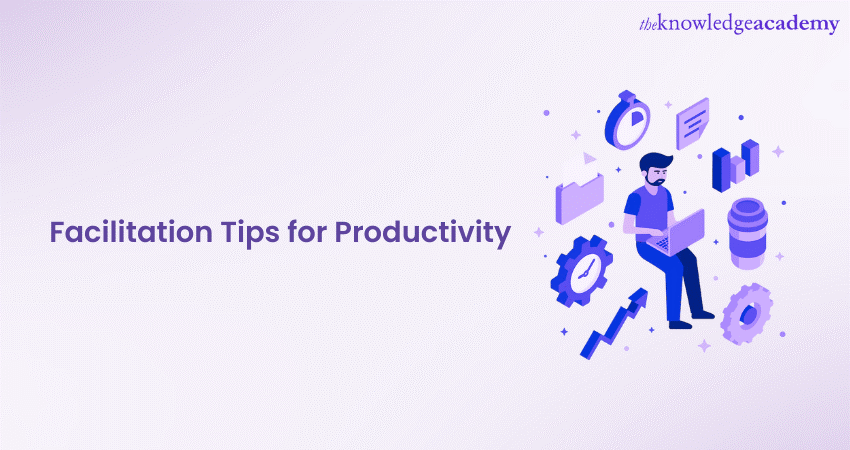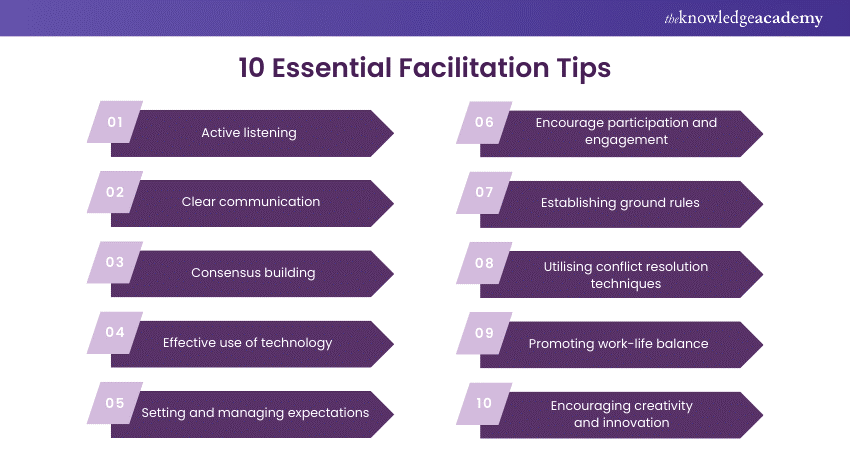We may not have the course you’re looking for. If you enquire or give us a call on + 1-866 272 8822 and speak to our training experts, we may still be able to help with your training requirements.
We ensure quality, budget-alignment, and timely delivery by our expert instructors.

Productivity is a significant aspect of every business environment. Ensuring your team stays focused and efficient can often be a challenging task. This is where the role of a Facilitator comes into play. In this blog, we will explore the various group Facilitation Tips and techniques a Facilitator can use to boost Productivity in a team setting. Keep reading!
Table of Contents
1) Understanding the role of a Facilitator
2) Facilitation Tips and tricks for productivity
a) Active Listening
b) Clear communication
c) Consensus building
d) Effective use of technology
e) Setting and managing expectations
f) Encourage participation and engagement
g) Establishing ground rules
h) Utilising conflict resolution techniques
i) Promoting work-life balance
j) Encouraging creativity and innovation
3) Conclusion
Understanding the role of a Facilitator
The role of a Facilitator is complex and dynamic, involving multiple responsibilities. Essentially, a Facilitator is a guide, helping teams navigate through their tasks more efficiently and effectively by adhering to the principles of facilitation. This involves setting the tone for interaction, managing conflicts, fostering collaboration, and guiding the decision-making process. A Facilitator must be adept at active listening, clear communication, and skillful mediation to create a supportive environment where all ideas are valued and respected. Furthermore, they should promote creativity, learning, and growth among team members. Ultimately, the role of a Facilitator is about empowering the team, promoting effective collaboration, and driving Productivity to achieve common objectives. Mastering Facilitation Skills is key to success in this role.
Facilitation Tips and tricks for Productivity
Facilitation is the art of leading groups through processes towards agreed-upon objectives in a manner that encourages participation, ownership, and creativity by all those involved. Facilitation can enhance productivity by improving the quality and efficiency of group work, as well as the satisfaction and engagement of group members. Here are some Facilitation Tips and tricks for productivity that you can use in your meetings, workshops, and events:

Active Listening
Active Listening is much more than simply "not speaking." It's about fully engaging with the speaker both verbally and non-verbally. This involves maintaining eye contact, providing verbal affirmations like 'yes' and 'I see,' and giving non-verbal cues such as nodding, open body language, and leaning forward slightly.
You can also summarise what was said to confirm understanding or ask follow-up questions to encourage deeper exploration of thoughts and ideas. By practising Active Listening, Facilitators foster trust and respect, which encourages open dialogue and leads to more productivity.
Clear communication
Clear communication is not only about how you deliver information but also about how you receive it. As a Facilitator, it's important to deliver clear, concise, and comprehensive information to your team.
Use plain, direct language and break down complex topics into smaller, manageable chunks. But also ensure that you are understanding the information that's being communicated to you. Request clarification when needed, and reflect back your understanding to the speaker for confirmation. Miscommunication can cause unnecessary delays and errors, so clear communication is crucial for team productivity.
Consensus building
Building consensus is about facilitating a process where all team members can put their thoughts and ideas forward, discuss differing points of view, and eventually agree on a common course of action. This process can often be challenging, especially when dealing with complex issues or divergent opinions.
As a Facilitator, your role is to ensure that everyone's voices are heard, to mediate conflicts, and to guide the group towards a mutually satisfactory resolution. This shared decision-making process encourages collaboration, fosters commitment, and leads to better, more sustainable solutions, thereby enhancing team productivity.
Effective use of technology
Leveraging technology effectively is an important skill for modern Facilitators. It's not just about using the latest technologies but also about choosing the right tool for the task at hand. Use relevant Project Management tools to assign tasks, track progress, and manage deadlines.
Utilise collaboration platforms for real-time communication, brainstorming, and document sharing. Video conferencing tools can Facilitate remote meetings, and online surveys or polls can be used to gather feedback or make collective decisions. Training your team to use these tools effectively can significantly enhance communication, collaboration, and, ultimately, productivity.
Setting and managing expectations
Setting and managing expectations involves clearly defining what needs to be achieved, who is responsible for what, when it needs to be done, and how success will be measured. These expectations should be agreed upon by all team members and should be reviewed regularly. As a Facilitator, you should provide clear, constructive feedback and recognise individual and team achievements, which can motivate your team members and help them stay focused and productive.
Unleash your team's potential with our Productivity and Time Management Course – your pathway to optimised performance!
Encourage participation and engagement
Encouraging participation and engagement is about creating an inclusive environment where every team member feels safe to express their thoughts and ideas. Use different group facilitation techniques such as round-robin (where everyone gets a turn to speak), brainstorming sessions, breakout groups, or role-playing. Implementing effective facilitation techniques enhances collaboration and fosters a dynamic team environment. Create a culture of appreciation where ideas are welcomed and valued, not judged or dismissed. This sense of belonging and engagement can drive motivation and commitment, leading to a more active, productive team.
Establishing ground rules
Ground rules set the tone for how the team will communicate with each other. These can be established collectively during the first meeting, ensuring that everyone has a say in the rules that will govern the team's interaction.
Ground rules can be basic, like 'one person talks at a time', 'no interruptions', 'all ideas are valid and respected', or more specific to suit the team's unique needs. Regularly revisiting these rules can keep the team aligned, ensuring smooth interaction and collaboration, thereby fostering productivity.
Utilising conflict resolution techniques
Conflicts are inevitable in a team setting, and as a Facilitator, it's important to handle them effectively. This involves detecting the root cause of the conflict, encouraging open and respectful discussion, and guiding the team towards a mutually acceptable solution.
Techniques like 'Active Listening', 'mediation', and 'negotiation' can be very helpful. By resolving conflicts in a respectful manner, you can prevent disruptions and maintain a productive work environment.
Promoting work-life balance
Promoting work-life balance is all about acknowledging that team members have personal lives outside of work. Encourage regular breaks during work hours, promote flexible work schedules where possible, and respect time off. Techniques such as time blocking, mindfulness exercises, or wellness activities can also be beneficial. These practices can help prevent burnout, increase job satisfaction, and maintain a high level of productivity over the long term.
Encouraging creativity and innovation
Creating a culture that emphasises creativity and innovation can be a powerful driver of Productivity. As a Facilitator, you can promote creativity by creating a safe space where all ideas are welcomed and valued.
Encourage brainstorming sessions, provide constructive feedback, and celebrate creative problem-solving. Provide opportunities for learning and exploration, and encourage team members to think outside the box. By fostering an innovative culture, you can keep your team motivated and drive productivity.
Ready to boost your team's Productivity? Sign up for our Facilitation Skills Training and embark on a journey towards more effective team leadership today!
Conclusion
To encapsulate, the art of successful facilitation, illuminated within the pages of facilitation books, demands a nuanced understanding of team dynamics, active listening, clear communication, and effective conflict management. By crafting and implementing ground rules, championing work-life balance, nurturing creativity, and cultivating a culture of continuous learning, facilitators can wield a transformative influence on team productivity. It's imperative to bear in mind that a facilitator's role is to empower the team, and delving into the insights of facilitation books provides invaluable tips to help you achieve this empowering synergy.
Boost your team's productivity and drive success with our industry-leading Industry Training!
Frequently Asked Questions
Why is a Facilitator important?

Facilitators are important because they can help a group of people achieve their goals in a productive, engaging, and participatory way. A Facilitator can design and guide a meeting process, keep the group on track, encourage participation, and ask relevant questions. A Facilitator can also manage conflicts, handle difficult situations, and ensure that everyone’s voice is heard.
What factors may affect the Facilitation of meetings?

Some factors that may affect the Facilitation of meetings are:
a) The purpose and objective of the meeting
b) The agenda and structure of the meeting
c) The participants and their roles
d) The Facilitation skills and techniques
e) The meeting environment and logistics
How can I use Facilitation Tips to improve my online workshops?

Online workshops can be challenging to facilitate, as they require different skills and tools than face-to-face sessions. However, you can use Facilitation Tips to make your online workshops more engaging, interactive, and effective:
a) Use a reliable and user-friendly platform that allows you to share your screen and use breakout rooms, chat, polls, and other features.
b) Plan your agenda carefully and communicate it to the participants in advance.
c) Use a variety of methods and activities to keep the participants interested and involved.
What are the other resources and offers provided by The Knowledge Academy?

The Knowledge Academy takes global learning to new heights, offering over 3,000 online courses across 490+ locations in 190+ countries. This expansive reach ensures accessibility and convenience for learners worldwide.
Alongside our diverse Online Course Catalogue, encompassing 19 major categories, we go the extra mile by providing a plethora of free educational Online Resources like News updates, Blogs, videos, webinars, and interview questions. Tailoring learning experiences further, professionals can maximise value with customisable Course Bundles of TKA.
What is Knowledge Pass, and how does it work?

The Knowledge Academy’s Knowledge Pass, a prepaid voucher, adds another layer of flexibility, allowing course bookings over a 12-month period. Join us on a journey where education knows no bounds.
What are related Industry Training and blogs provided by The Knowledge Academy?

The Knowledge Academy offers various Industry Training, including Facilitation Skills Training Product Management Training and Supply Management Courses. These courses cater to different skill levels, providing comprehensive insights into Facilitation Techniques.
Our Industry Training Blogs covers a range of topics related to Facilitation, offering valuable resources, best practices, and industry insights. Whether you are a beginner or looking to advance your Business skills, The Knowledge Academy's diverse courses and informative blogs have you covered.
Upcoming Business Skills Resources Batches & Dates
Date
 Facilitation Skills Training
Facilitation Skills Training
Fri 28th Feb 2025
Fri 4th Apr 2025
Fri 16th May 2025
Fri 11th Jul 2025
Fri 19th Sep 2025
Fri 21st Nov 2025






 Top Rated Course
Top Rated Course



 If you wish to make any changes to your course, please
If you wish to make any changes to your course, please


